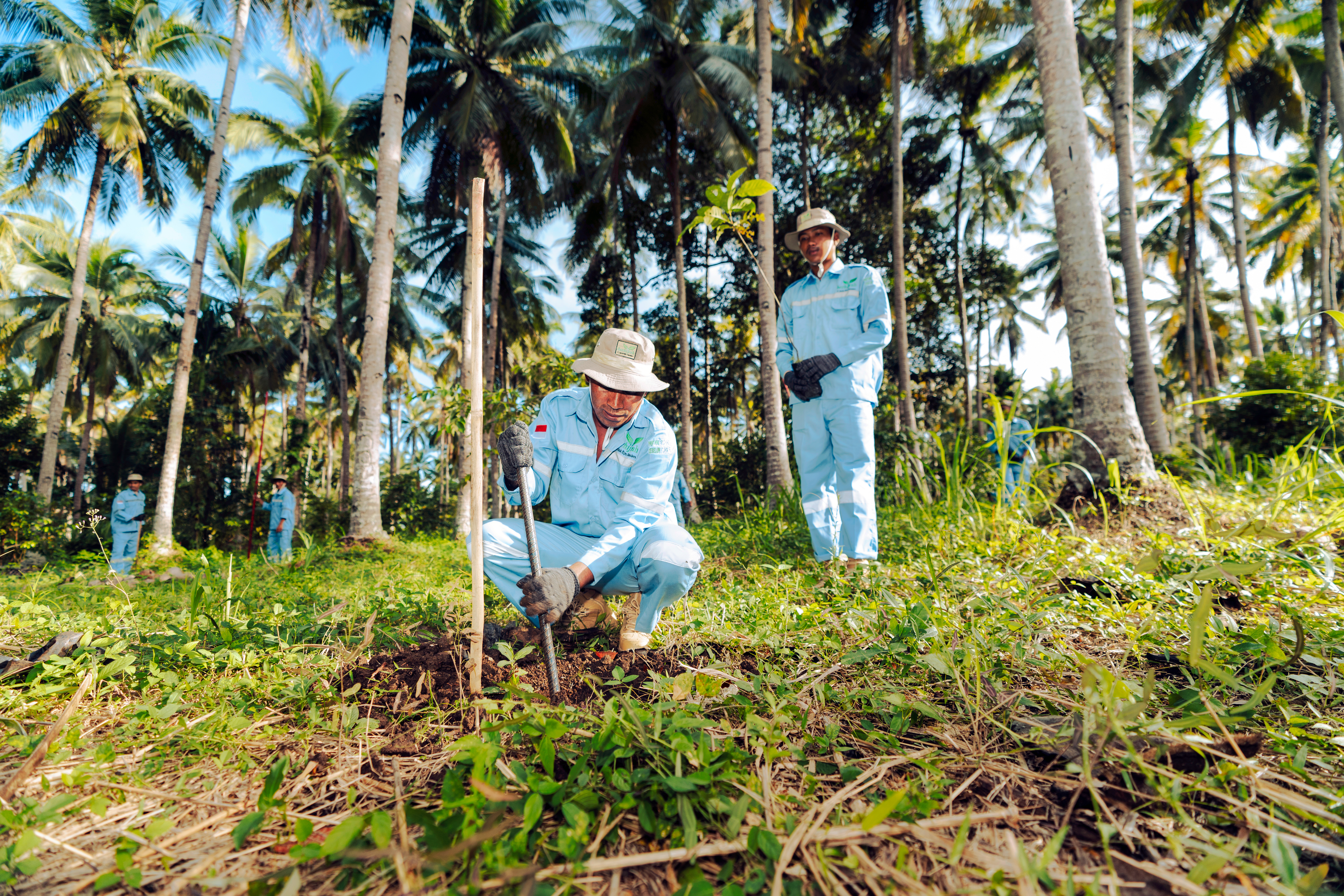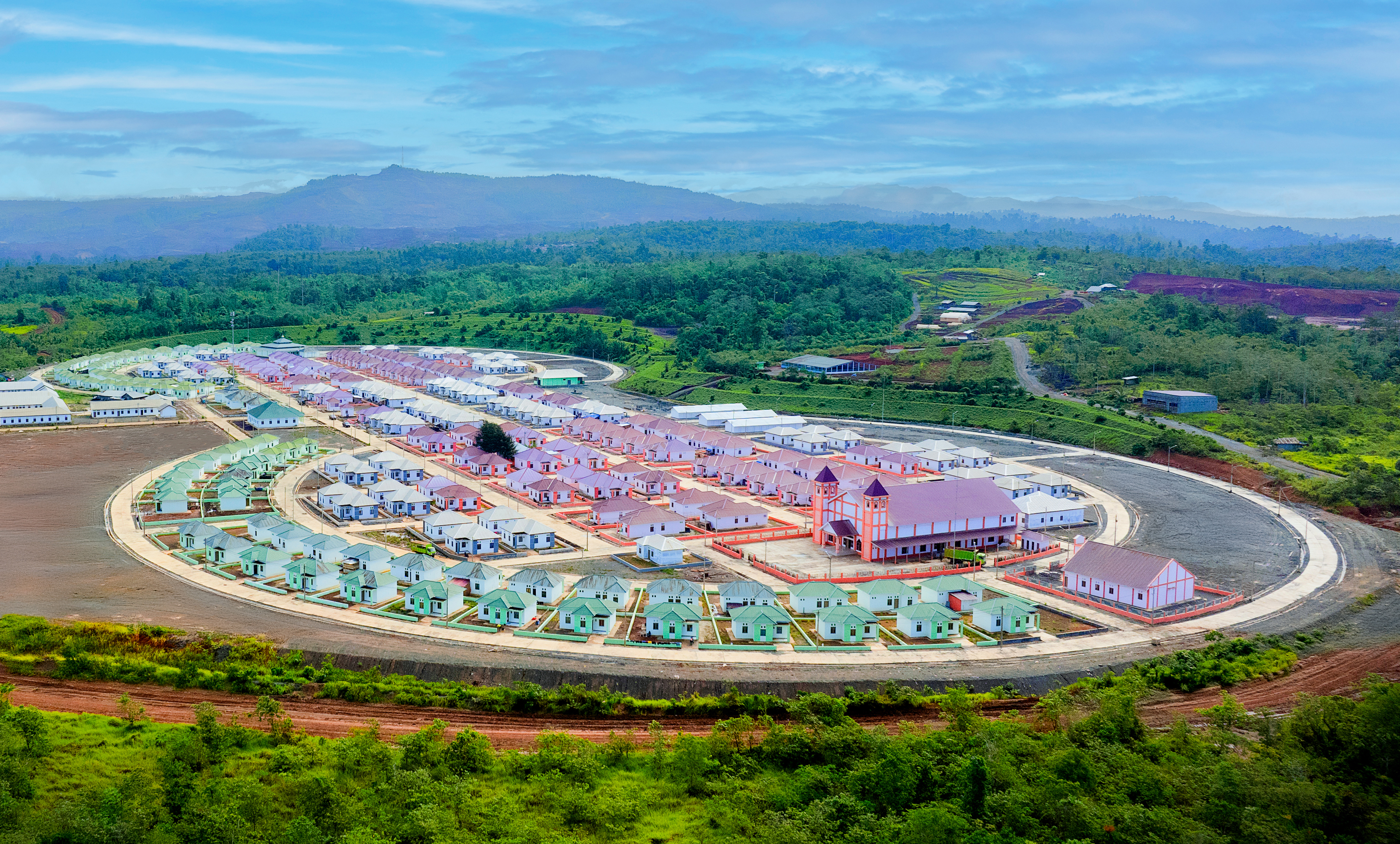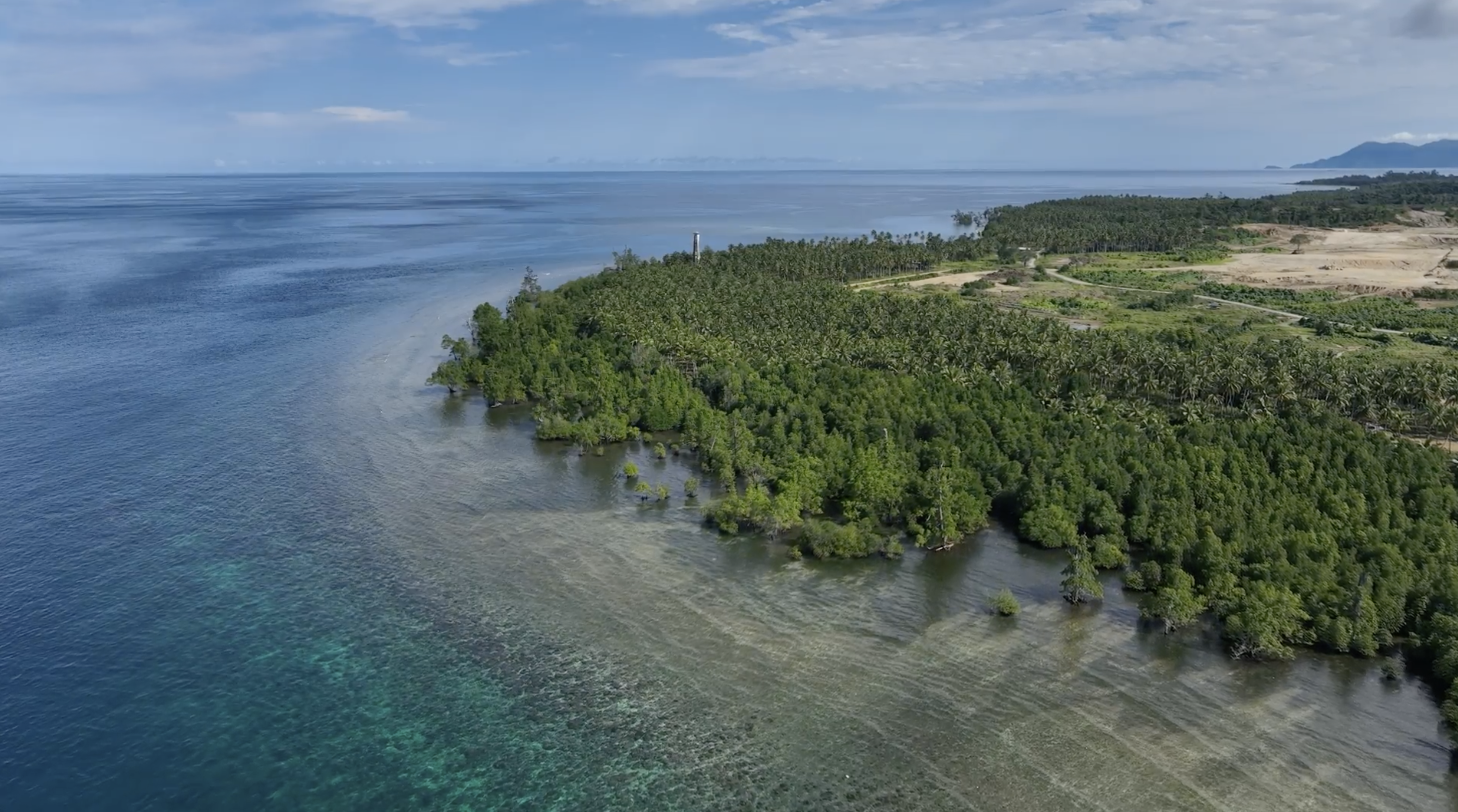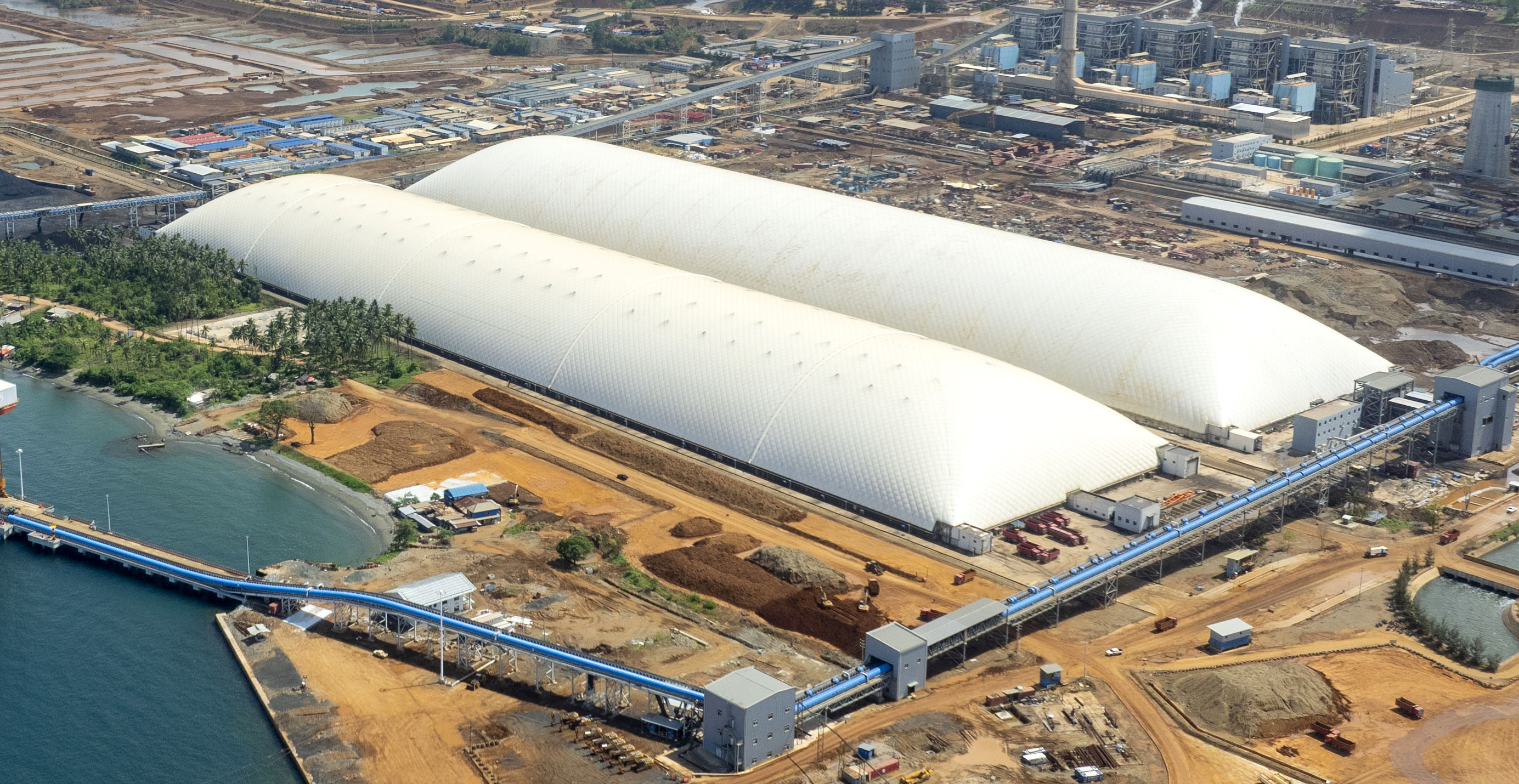


14 April 2025
Amid shifting geopolitical alliances and mounting trade tensions, the global nickel market is undergoing a period of profound transformation. From new tariffs and regional sourcing mandates to rising demand for climate-aligned minerals, producers are navigating heightened scrutiny and uncertainty. For Harita Nickel, this turbulence reaffirms a core belief: short-term volatility must not distract from long-term purpose.
That is why we are choosing this moment to release a renewed statement of commitment. We remain firmly rooted in the belief that responsible mining—grounded in environmental stewardship, community partnership, and international accountability—is the most strategic path forward. While the road is not always smooth, we are staying the course. Because sustainability is not a destination; it is a continuous journey, and we are here for the long run.
This document summary is part of our continued effort to share that journey transparently — a reflection of our progress and the direction we're heading. As part of this momentum, we plan to release our latest Sustainability Report by the beginning of May 2025, which will further outline our environmental, social, and governance (ESG) performance and future priorities.
As demand intensifies for traceable, low-impact nickel—especially within electric vehicles and clean technology supply chains—Harita Nickel recognizes that environmental responsibility has evolved beyond compliance. It is now a strategic lever, essential to securing long-term access to markets, financing, and partnerships.
Our commitment to environmental improvement is not just about meeting expectations; it is about redefining them. By actively aligning with globally respected ESG standards, we aim to:
From the outset, Harita Nickel has embraced a spirit of continuous improvement—evolving steadily from modest beginnings into a company that consistently strives to raise the bar for sustainability within the nickel industry. This mindset has shaped how we grow, adapt, and remain accountable for the responsibilities that come with our operations.
We view responsible mining not as a fixed destination, but as a continuous journey — one that requires reflection, innovation, and a willingness to take on challenges that drive long-term impact. Over the years, our efforts have been recognized through various national and industry awards for environmental best practices — affirming that progress is possible when commitment is sustained.
As part of this journey, Harita Nickel has committed to undergoing the independent audit process of the Initiative for Responsible Mining Assurance (IRMA) — widely regarded as the most rigorous and comprehensive mining standard globally. With more than 400 requirements across environmental, social, and business integrity domains, IRMA sets a high benchmark. To date, only two mining companies in Asia — including Harita Nickel — have voluntarily undertaken this process, underscoring both the rarity and ambition of our commitment.
By pursuing this path, we are not simply fulfilling obligations; we are proactively raising our standards — aligning our practices with globally respected benchmarks and reinforcing our long-term commitment to operational and sustainability excellence.
In parallel, we have continued to implement a range of forward-looking measures to protect the environment and support ecosystem resilience. These include enhanced tailings and residue handling systems, the utilization of processing residue for creating various recycled products and reclamation purposes, more efficient and regulation-aligned freshwater resource management, coastal and marine protection efforts, and biodiversity conservation initiatives. Each initiative is guided by a clear framework, informed by data, and designed to deliver measurable improvements.
In addition to IRMA, we initiated the process of assessing the conformance of our responsible sourcing procedures with the Responsible Minerals Initiative Responsible Minerals Assurance Process (RMI RMAP). We have successfully completed our first conformance audit for one production facility, and the audit process for a second facility is underway. This conformance audit confirms that risk management practices regarding conflict management, human rights, and supply chain transparency are in place, and that our sourcing procedures do not finance or benefit armed groups or sanctioned entities. More information is available in our public due diligence report.
In preparation for IRMA and RMI RMAP, we are reinforcing our governance frameworks to ensure transparency, accountability, and strive for alignment with international best practices. These include globally recognized standards, included in the IRMA and RMI RMAP frameworks and requirements, such as the UN Guiding Principles on Business and Human Rights, ILO Core Conventions, and OECD Guidelines. At the same time, we remain fully committed to complying with all relevant prevailing local laws and regulations. This beyond-compliance approach not only strengthens our license to operate but also supports our broader purpose: to create lasting value while contributing to the responsible development of Indonesia’s mineral resources.
Since the beginning of our operations in 2011, Harita Nickel has steadily advanced its environmental performance across multiple fronts. Our milestones reflect a progressively integrated and adaptive approach to natural resource management, developed through science-based planning, technological innovation, and collaboration with stakeholders and experts.
2010–2017: Building the Foundations
In our early years, foundational studies played a key role in shaping responsible operations. Hydrology assessments and land use planning were conducted to support sustainable development and informed the design of a comprehensive water management plan. This plan set the basis for responsible water use, recycling, and discharge across our operations.
To mitigate potential impacts on surrounding ecosystems, we implemented a runoff management system by constructing drainage channels and sediment ponds to direct and treat water affected by mining activities. To date, we have built 52 sediment ponds, covering a total area equivalent to more than 500 Olympic-sized swimming pools, dedicated to sustainable water treatment and recycling. Buffer zones were also established around lakes, rivers, and coastal areas to protect sensitive water bodies and maintain natural hydrological flows. These early efforts helped lay the groundwork for a more structured and integrated environmental approach.
2017–2023: Scaling Solutions and Enhancing Environmental Safeguards
As downstream processing activities expanded, our environmental programs evolved to meet higher standards. At that time, Harita Nickel became the first mining company in Indonesia to implement a dry stack tailings facility (DSTF), which was placed within a mined-out pit. This facility was supported by comprehensive water management and testing procedures around the site — significantly enhancing tailings safety while reducing the risk of water contamination.
We also adopted seawater for operational use as a cooling agent and sediment settling agent — a move that eased pressure on freshwater sources. Around the same time, we implemented a near closed-loop water system that enabled the recycling of over 7 billion liters of water, supporting broader conservation goals.
To monitor and protect marine ecosystems, ocean monitoring systems were deployed — capturing critical data such as temperature, alkalinity, and other indicators of environmental health. A landscape-based nature risk assessment, assessing terrestrial and aquatic environments based on Taskforce on Nature-related Financial Disclosures (TNFD) recommendations, was also launched to better understand and mitigate hydrological and ecological risks.

As part of our broader ecosystem rehabilitation efforts, we started to be actively involved in reforestation initiatives in Desa Galala and the Kawasan Hutan Lindung areas of South Halmahera. Across these areas, a total of 387,750 tree saplings have been planted over a 517-hectare landscape — contributing to watershed restoration, habitat recovery, and long-term environmental resilience.
2023 and Beyond: Reinforcing Resilience and Transparency
In our post-IPO phase, we are entering a new chapter of environmental and social enhancement — marked by stronger ESG governance, external validation, and deeper community engagement. A key milestone in this journey is our ongoing independent assessment under the Initiative for Responsible Mining Assurance (IRMA). This process provides not only third-party validation of our existing practices, but also a valuable roadmap for improvement, helping us align more closely with the highest global standards for responsible mining.

In parallel, we are actively integrating recommendations from our 2023 Human Rights Due Diligence (HRDD), which assessed key risks and rights-based needs of our operations. Among the first priorities is ensuring equitable access to natural resources — including support for freshwater supply systems in areas like Kawasi Baru — and strengthening internal capacity to uphold human rights in daily decision-making. These inputs are being translated into a concrete roadmap, including training, policy refinement, and mechanisms for ongoing stakeholder feedback.
This work is also complemented by insights from the Climate Change Risk Assessment conducted by USAID in 2023, which helps inform our broader risk management approach.
Operationally, we have expanded sediment pond capacity to enhance runoff treatment and introduced SPARING — a real-time, automated water quality monitoring system that reinforces regulatory compliance and transparency. We also continue to fulfill government regulations on responsible mining by actively participating in watershed rehabilitation programs aimed at restoring and preserving natural ecosystems. To date, we have rehabilitated over 7,000 hectares of watershed land — including an additional buffer of 10–25% beyond the required area — as part of our commitment to exceed baseline environmental obligations. These advancements reflect a broader shift toward proactive, technology-driven environmental safeguards.
Furthermore, we are refining our Water Management Plan in partnership with external experts, embedding adaptive risk management to better address future climate, hydrological, and operational challenges. These efforts — together with IRMA’s external guidance and our internal commitment to human rights — reflect our broader ambition to lead responsibly, remain accountable, and continuously raise the bar for sustainable performance in Indonesia and beyond.
Complementing our operational improvements is Harita Nickel’s commitment to environmental stewardship and inclusive development — with a strong emphasis on restoring natural ecosystems, empowering local communities, and reducing our climate impact.

Working closely with local partners, we have supported the rehabilitation of 22 hectares of mangroves, helping to restore coastal biodiversity, improve natural water filtration, and increase shoreline resilience.
In addition to improving living conditions and promoting economic independence, we continue to support community-based agro-fishery programs, that integrate environmental protection with sustainable economic opportunities. These initiatives reflect our belief that environmental progress and community wellbeing are interdependent — and that inclusive, locally rooted action often delivers the most lasting impact.
For every community initiative, we employ an inclusive and participatory approach — obtaining community consent and conducting engagement and needs assessments to ensure our support is focused, effective, and genuinely beneficial. To enhance transparency, we have also begun aligning our disclosures with the Taskforce on Nature-related Financial Disclosures (TNFD), allowing us to better articulate how our operations depend on and affect ecosystem services, particularly those related to water regulation and biodiversity.
Our commitment to inclusive development is also reflected in the measurable social value we aim to generate through our operations. In 2024 alone, Harita Nickel created 729 local jobs, engaged 65 local suppliers with transaction values reaching IDR 150 billion, and supported 51 MSMEs, generating a total turnover of IDR 5.1 billion. We also worked alongside 420 farmers and fishers, contributing IDR 2.4 billion in combined agricultural and fisheries revenue. Beyond economic impact, our social investments extended to healthcare, infrastructure, education, and essential services — including support for monthly Posyandu visits for 356 mothers and children, 63 local student scholarships, and free access to electricity and clean water for 298 families. These efforts, grounded in the principles of shared value and sustainability, form a key part of our broader Social Return on Investment (SROI) strategy.
In addition to our land-based initiatives, we also monitor sea water quality around Obi Island through CTD (Conductivity, Temperature, and Depth) measurements, helping us assess potential impacts on the marine environment and guide evidence-based ocean stewardship practices.
In parallel, we are also advancing our climate commitments. Using 2022 as a baseline, the company has committed to a 30% reduction in emissions by 2030, with a long-term goal of achieving Net Zero by 2060. A solar PV plant is under construction to reduce our reliance on coal-fired energy and cut emissions from electricity use. We are also reducing our dependence on fossil fuels by integrating alternative energy sources, such as used cooking oils, into our operational mix.

To further reduce our environmental footprint, we operate an indoor coal storage dome with a capacity of 370,000 tons, ensuring that coal loading occurs in a fully enclosed environment to minimize coal dust dispersion and support air quality management in the surrounding area.
Our path forward will continue to be shaped by collaboration. We understand that the challenges ahead — from managing nature-related risks to building climate resilience — require partnerships that bring together scientific expertise, local knowledge, and shared accountability.
Among our priority initiatives:
These collaborations reflect our transition from commitment to action — and from action to measurable impact. As we move forward, we aim to scale our ambition while staying grounded in the values of responsibility and inclusive growth.
At Harita Nickel, we believe that trust is built through consistent progress and meaningful impact. As we continue our journey, we remain committed to being collaborative and accountable — meeting international standards while actively contributing to a more competitive and future-ready Indonesia.
Transparency is central to this commitment. We will continue to share our progress and invite open, constructive feedback as part of our long-term ESG accountability framework. As a further step in that direction, we look forward to releasing our upcoming Sustainability Report at the beginning of May, which will provide deeper insights into our performance, priorities, and path forward.
By aligning our operations with internationally recognized benchmarks and maintaining the agility to lead responsibly within the nickel industry, we are building a business that is not only sustainable and resilient, but also a source of national pride.
Through these ongoing efforts, we aim to deliver lasting value — for our stakeholders, for the environment, and for Indonesia’s role in the global economy.
Go Top